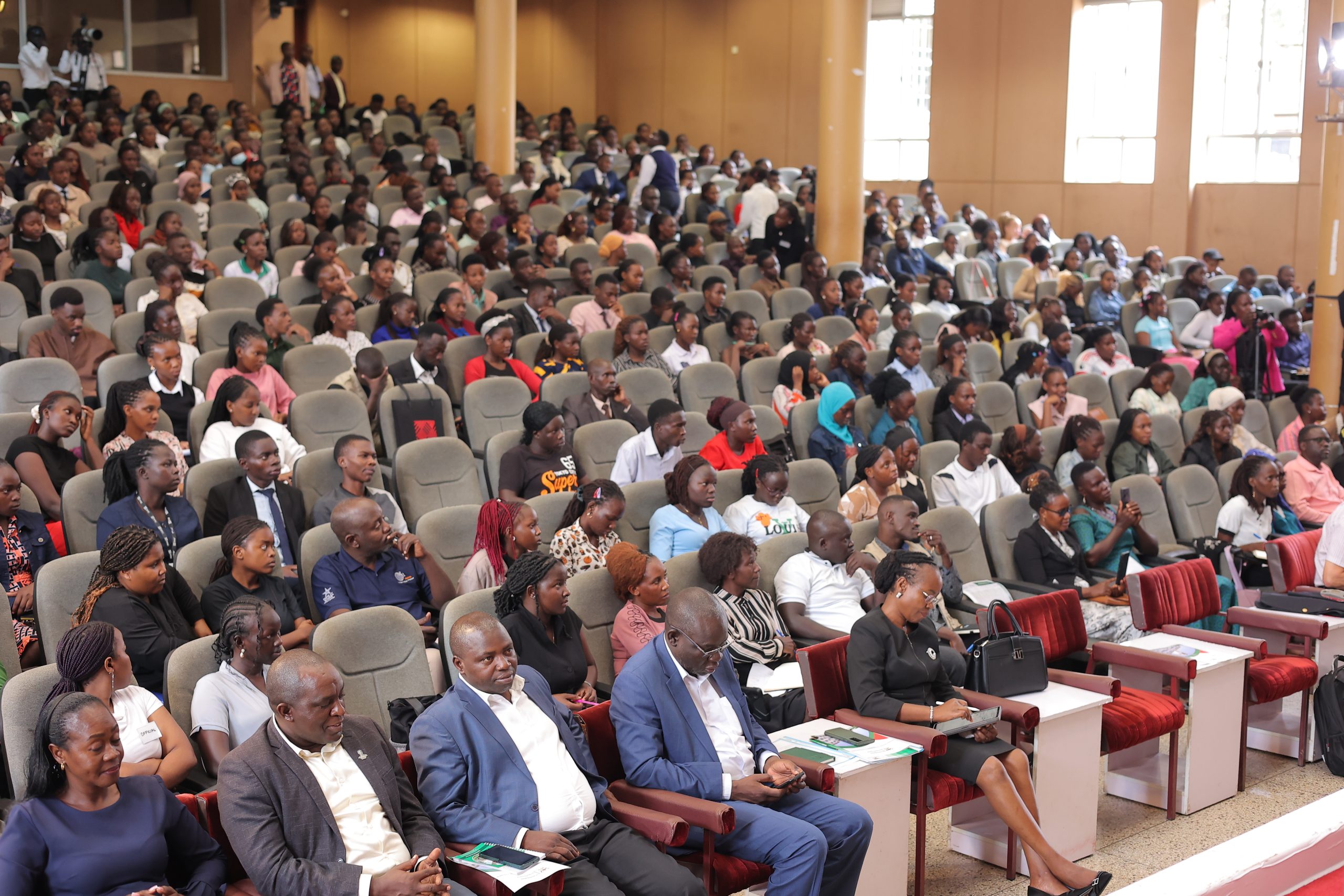October 16, 2025: Young entrepreneurs from Makerere University have been urged to focus on value addition, quality and branding if their innovations are to grow into sustainable businesses in the country.
The call was made by several speakers during the opening of the two-day Uganda Entrepreneurship Congress and Youth Expo (16th to 17th October 2025) hosted by Makerere University College of Business and Management Sciences, under the theme, Brewing Prosperity: Youth Entrepreneurship in Uganda’s Coffee Value Chain.
The annual event serves as a national platform for youth, entrepreneurs, investors, policymakers, and private sector leaders to unlock youth-driven innovation.
The entrepreneurship congress and expo features over 600 students from the College of Business and Management Sciences (CoBAMS) showcasing more than 300 innovations, with a spotlight on the coffee sector. The expo is among the several initiatives that the University has launched to unlock the entrepreneurship potential of students and youth in Uganda.
According to Professor Barnabas Nawangwe, Vice Chancellor of Makerere University, the move was motivated by the high levels of youth unemployment in the country, which currently stands at 16.1 percent for those aged 18 to 30 (Uganda Bureau of Statistics, 2024).
Addressing the participants during the Entrepreneurship Congress, the Chief Guest-Mr. Odrek Rwabwogo, Chair of the Presidential Advisory Committee on Exports and Industrial Development, rallied students and youth to embrace entrepreneurship.
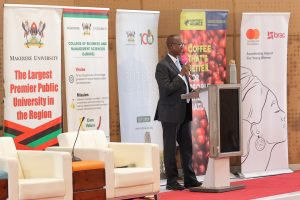
“Education can come from strange places. Everyone has gifts, talents, abilities and resources to utilize. In a country with many unmet needs, entrepreneurship is about what you change, he said.
Mr. Rwabwogo stressed the value of local innovation. “Not everything can be commercialised especially in a country that imports 90% of what it consumes. Identify needs that outsiders will never cater for-our language, culture, and food. Those are unique strengths, he remarked.
Mr. Rwabwogo challenged the young entrepreneurs to think beyond Uganda’s borders, when he highlighted that true entrepreneurship lies in producing goods that can compete on the international market.
“When you build a business that can sell in another person’s market, you are a hero or heroine because what you have done is disrupting the status quo, which praises import. In this country, for instance in Kikuubo business area, you hear statements such as my container is about to reach Uganda, and not my container is leaving the yard in Uganda and is taking Ovocado to Spain or another country. I want the language to change.”
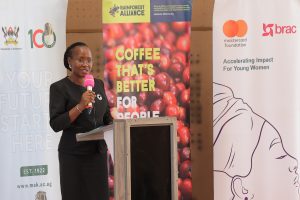
Representing the Vice Chancellor of Makerere University-Professor Barnabas Nawangwe, the Deputy Vice Chancellor (Academic Affairs), Professor Sarah Ssali noted that the expo comes at a time when youth unemployment stands at 16.1 percent, which informs the university’s move to challenge this growing reality.
“I am glad to note that Makerere University continues to champion innovations and turning graduates from job seekers into job creators, and champions of societal transformation. The expo is Makerere’s attempt to strategically locate itself in the conversation around coffee being the biggest export earner in the country,” she said.
Statistics indicate that Uganda exported 667,037 kilograms of coffee worth US$162.36 million, highlighting the sector’s importance to the economy and its role as a key foreign exchange earner. Despite this, most youth are excluded from high-value segments of the coffee value chain, such as processing, branding, and export, often remaining confined to low-income farm labor.
According to Professor Ssali, this disconnect represents both a critical risk and an unprecedented opportunity. The expo, therefore, serves as a national platform for youth, entrepreneurs, investors, policymakers, and private sector leaders to unlock youth-driven innovation across the coffee value chain, from climate-smart farming and agri-tech to processing, branding, and global market access.
She believes that by moving beyond subsistence farming towards ownership, innovation, and high value enterprises, the youth in Uganda can secure a greater share of the global coffee market while catalyzing job creation and sustainable development.
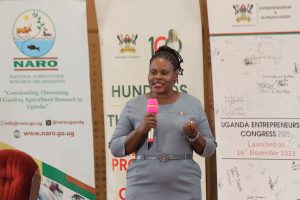
Dr. Sarah Bimbona, Director of the Makerere University Entrepreneurship and Outreach Centre, said several of the innovations on display have the potential to be scaled into viable enterprises. She added that these new ventures would build on the success of over 150 companies that emerged from previous editions of the entrepreneurship expo.
Dr. Bimbona used the golden opportunity to highlight three requests for support. She appealed for support, noting that the Centre has spent nine years nurturing over 1,000 business ideas annually, yet the impact of these ideas remains difficult to measure due to lack of resources for tracer studies. Commending Mr. Rwabwogo for accepting to become the Patron of the Centre, Dr. Bimbona requested him to amplify the Centre’s reach and support for youth, women and broader economic development.
On opening opportunities, the Centre offers guidance to entrepreneurs free of charge and seeks partnerships to connect student ideas with the industry. “We have the expertise and experience. We just need that extra push to remain relevant in the business community,” she stated.
Dr. Bimbona reiterated the transformative power of mentorship that is provided through the Makerere University Entrepreneurship and Outreach Centre.
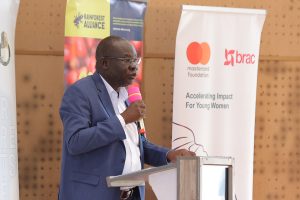
The Dean, School of Business, Associate Professor Godfrey Akileng specified that entrepreneurship is one of the flagship initiatives of the College of Business and Management Sciences. He encouraged the students to seize the moment. “This is your opportunity to showcase your innovations, to interact with industry players, and to change your mindset from job-seekers to job creation,” he said. “Let the entrepreneurship congress awaken a new spirit in you-one that says-yes, I can make it.”
Associate Professor Akileng cited the story of Bill Gates as an example of what determination and innovation can achieve, reminding the students that greatness often starts from simple beginnings. “There is no reason we cannot build something extraordinary from coffee and other local products,” he stated, emphasizing the value of entrepreneurship in national transformation.
The Dean, School of Business, expressed deep appreciation to the industry partners for their collaboration and generosity. “You have invested time, knowledge and financial support to be here. Thank you for supporting the Entrepreneurship Congress and Expo,” he remarked.
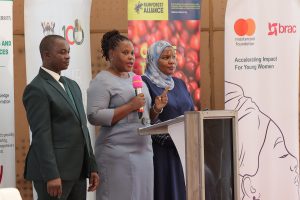
Associate Professor Akileng commended Dr. Sarah Bimbona, and the entire entrepreneurship team namely Dr. Cathy Mbidde, Dr. Kasimu Sendawula, Dr. Hanifah Nantale, Dr. Marion Nanyanzi, and Mr. Luke Muhwezi for nurturing student entrepreneurs at Makerere University.
The entrepreneurship congress featured a keynote address, and two panels focusing on: Market Readiness, Value Addition and Story Telling, as well as, Financing the Future.
The Keynote Speaker, Mr. Moses Nyabila, CEO of aBi Development Ltd, urged the government and private sector to establish an export fund to support young entrepreneurs in starting their businesses.
Mr. Nyabila explained that the fund would help young entrepreneurs launch simple start-ups that have the potential to grow into larger enterprises. The fund, he noted, would not only support production, but also empower entrepreneurs to handle basic packaging and export processes. According to him, such an initiative represents a critical form of value addition.
Mr. Nyabila added that such initiatives would help challenge the current status quo, which prioritizes imports over exports. He used the expo as a platform to call on the government to shift the national mindset toward building Uganda’s presence in the global export market.
During the panel discussions, contributors discussed several steps through which the young entrepreneurs can be equipped with skills that can help them to join the competitive market.
Some of the panelists included: Bob Paul Lusembo-Head of Business Growth, BRAC Uganda Bank, Geoffrey Okidi-Financial Deepening Uganda, Nakabuye Flavia Bwire- Inclusion and Microfinance Specialist, and Sectrine Muganzi-Coffee Farmer and Youth Entrepreneur.
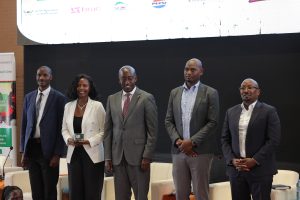
The different Speakers acknowledged that while Uganda has no shortage of innovations, gaps in value addition and branding continue to undermine product competitiveness, reinforcing the stereotype that Ugandan products are of poor quality.
One of the panelists, Jackline Arinda Akampwera, CEO of Jada Coffee, noted that branding strongly influences perceptions of quality. In the same development, she argued that limited branding is also largely responsible for the misconception that Ugandan products are substandard.
“We have this perception that when we see a brand on a billboard, it must be of good quality. Branding is therefore central to entrepreneurship,” Arinda said. “In Uganda, there’s limited branding and value addition, which affects the marketability of our products,” she said
Arinda shared that before she joined the coffee business, she realized Uganda had no widely recognized coffee brands, despite being a top coffee producer. This inspired her to create a brand that would appeal even to non-coffee drinkers.
“You don’t have to be a coffee consumer to know coffee brands—just like you don’t have to be a football fan to know who Ronaldo is,” she said. “That’s what branding does. Even if people don’t drink coffee, they should know that Jada Coffee exists. I came in to change the way the market operates.”
She added that this lack of branding also explains the low domestic consumption of coffee. To address this, Arinda began introducing coffee at social functions—events that traditionally only offered juices and sodas—as part of efforts to popularize local coffee consumption.
Gordon Katwirenabo, Assistant Commissioner, QA and Value Addition, MAAIF agreed with Arinda. He stated that the government is very intentional in promoting value addition to the country’s produces.
“Value addition is very prominent in our policy framework. If you produce and get only money for production, then there is no value, and then you cannot achieve the economic importance and transformation that we need in our communities. So, through that were are very intentional in supporting value addition,” he said.
On his part, Godwin Birungi, Founder, Rubungi Enterprises noted that while branding is very important, branding alone is not enough if the products themselves lack quality. He argued that the two—branding and quality, must reinforce each other for a business to thrive.
“I realized that there is a need to be consistent in producing high quality products. The more you produce high quality, the more you lift your brand,” he said

